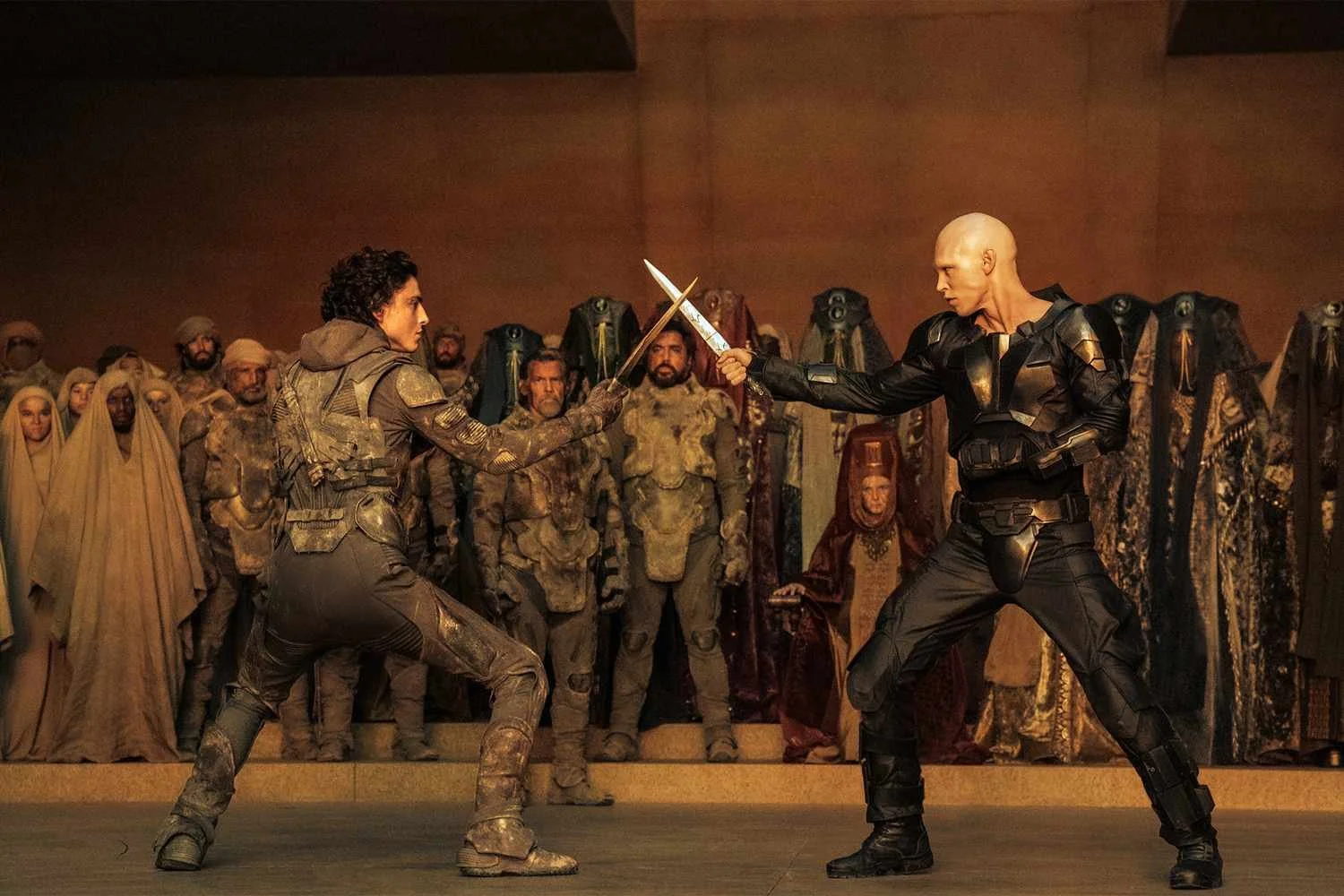“Dune: Part Two” Review
Timothée Chalet reprises his role as the messianic Paul Atriedes in “Dune: Part Two”, the sequel to the 2021 critical and commercial hit “Dune”.
Usually when I see a movie, it just takes one viewing before I write down my thoughts. In the case of “Dune: Part Two”, I needed to see the film twice (including a viewing on a massive 70MM IMAX film print) before I could discuss the merits of this much anticipated sequel to my favorite film of 2021 but not because the film is hard to follow or because it confused me. I knew immediately after seeing the film for the first time that I adored it but “Dune: Part Two” warranted an immediate second viewing to confirm this opinion in my mind. Not only is “Dune: Part Two” a masterfully crafted film, not only is it the best film I’ve seen from Denis Villeneuve but, along with “Dune: Part One”, this is one of my favorite science-fiction films of all time.
Set immediately after the events of “Part One”, Paul Atreides (Timothée Chalamet) and his mother Lady Jessica (Rebecca Ferguson) have survived the extermination of their powerful house and have fled into the desert of the planet Arrakis where they have joined the native tribe known as the Fremen (this plot summary is still less bloated compared to the opening minutes of David Lynch’s 1984 “Dune” adaptation). With these powerful new allies and a mighty prophecy boosting his status, Paul begins training with the Fremen as the warrior Muad’dib to wage war on the enemies that destroyed his family while stepping up to become the planet’s messiah.
While “Dune: Part One” was an excellent film, it was more about building up this universe, slowly burning towards an explosive climax that saw this noble family be torn apart by their sworn enemies. War was on the horizon but it hadn’t fully arrived yet. Instead, we got a massive battle. In “Part Two”, the war has come and it is breathtaking. Everything about this sequel is improved, heightened and expanded upon with Denis Villeneuve taking advantage of the film’s status as a sequel. With the audience fully immersed in the environment from the get-go, Villenueve is able to focus more on the action and evolves the characters, taking them to places that viewers that hadn’t read the book might not expect.
As for me, I’m beyond grateful that Villenueve had the good sense to make Frank Herbert’s 600 page novel into two films with a combined runtime of 5 hours and 21 minutes. The incredible world that Herbert created deserves this treatment and the 1984 film adaptation is a good example as to why. In Lynch’s film, due to the studio interference that drastically cut down the film’s runtime, the entire second half of the book was needlessly butchered and reduced so now, in the year 2024, we have a fully realized cinematic portrayal of Herbert’s vision and themes.
Like many other science-fiction and fantasy series (including “The Matrix” and “Harry Potter”) “Dune” uses the trope of the messiah. However, Herbert’s novels weren’t as blindly accepting of this as other fantasy stories. In “Dune: Part Two”, Paul not only knows that many among the Fremen view him as the chosen one but that this has been the plan of the religious order that his mother is a part of. He doesn’t want to be this prophet but he does see that he could use this title to convert the Fremen into following him to destroy his enemies which are also the enemies of the Fremen. “Dune: Part Two” does an excellent job of exploring Paul’s inner conflict as he must choose how much of his humanity he must let go in order to become this larger-than-life, almost god-like warrior so that he may triumph over those who wronged him.
In this role, Timothée Chalamet is really given the room to grow as Paul and his evolution over these two films has been a pleasure to view. For some reason, there’s a very vocal group of people who can’t stand this actor and I just don’t understand it. With outstanding performances in “Call Me By Your Name”, “Lady Bird”, “Little Women”, “Bones and All” and “Wonka”, he has cemented himself as one of the most outstanding actors of this generation and his portrayal of Paul Atriedes has all but confirmed this.
Rebecca Ferguson’s performance as Lady Jessica is also compelling as she takes on more responsibilities and uses her religious power to manipulate events in her son’s favor. Like Paul, she views prophecy as a means to secure leadership and to remove power from the hands of the wicked. Ferguson does a spectacular job of balancing the humanity of her actions with the regal splendor she is bestowed throughout the film.
While viewers of “Part One” might have been confused that Fremen characters like Stilgar (Javier Bardem) and Chani (Zendaya) were barely featured in the film, I knew that these people and many other new characters would have a much larger role in the sequel. Bardem and Zendaya are excellent at not only fulfilling the roles of Paul’s mentor and love interest respectively, but also showing the diverse reactions to Paul’s depiction as a messiah. Stilgar wholeheartedly believes in Paul and thinks that he will bring the Fremen to a Green Paradise while Chani despises the prophecy and views it as a tool to enslave the weak. The relationship between Paul and Chani is one of the most engaging elements of the film with strong chemistry and the powerful internal conflict Chalamet presents as he fins himself choosing between his desire for vengeance and his desire for love.
As for the film’s villains, the villainous Baron Vladimir Harkonnen (Stellan Skarsgård) and his brutal nephew Rabban (Dave Bautista) are given much more to do throughout the story as opposed to the first film where they spent most of it plotting their inevitable massacre of House Atreides. Now that they are the rulers of Arrakis again, their brutality has only increased and the presence of the Baron’s other nephew, Feyd-Rautha (Austin Butler), only exacerbates the desperate plight of the Fremen. Austin Butler’s psychotic dictator in the making was a pure delight to watch and presented a more-than-worthy intellectual and physical opponent for Paul Muad’dib Atreides. I firmly believe that Christopher Nolan was spot-on in comparing “Dune: Part Two” to “The Empire Strikes Back” because if the villains of the first film were Darth Vader in “Star Wars”, then this film has them behave in a diabolical manner that connects them more deeply to the protagonist just like in the landmark sequel to “Star Wars”.
The powerful action and emotional battles come to a head in the exciting climax of “Dune: Part Two” which sees Paul Atriedes (Chalamet) face down the psychotic Feyd-Rautha Harkonnen (Austin Butler).
Like the first film, the cast is so monumentally stacked that it would be impossible to individually detail their impact on the story. Whether it’s returning cast members like Josh Brolin as the stoic Gurney Hallack or newcomers like Florence Pugh as the future galactic ruler Princess Irulan and Christopher Walken perfectly cast as the Emperor of the Universe, there is no performance that is less than stellar. Behind the scenes, things are just as well put-together with every element of filmmaking being expertly handled. Greg Fraser’s award-winning cinematography is back and bigger than ever and Joe Walker’s fantastic editing makes this nearly three hour science-fiction epic completely engaging from start to finish.
What distinguishes this film from its predecessor is that it’s not just coasting on the goodwill that the first film built up. There are so many sequences that are jaw-dropping and blew my mind even though I have repeatedly watched “Dune: Part One” and have read the original books. What makes Villeneuve’s vision work is how he always assigns every shot a sense of scale regarding the characters. When Chani and Paul destroy a ship in a Fremen raid, you get to see them run in the foreground as this giant transport crashes in the background and emits a massive, fiery inferno. When the Fremen introduce the concept to the viewer of riding the massive sandworms that populate the planet, there are shots that put you in the perspective of actually controlling these behemoths. As for the film’s climax, the epic size and different uses of weaponry and hand-to-hand combat feel like something out of the iconic “Lord of the Rings” trilogy.
For me, the most valuable element of this film is the script because making “Dune” into a film was never going to be easy. Many have tried and failed with Alejandro Jodorowsky’s attempt in the 1970s failing to get off the ground (but it did make for a great documentary in 2013) and David Lynch’s film never living up to Herbert’s vison. The screenplays that Denis Villeneuve and Jon Spaihts have written for these two films have been insanely faithful and the world-building is truly remarkable when you consider the density of the book they were adapting. Even if you have never read the books, you will be able to become thoroughly invested in the machinations of the Fremen society, the political state of the galaxy and the secret plans of the Bene Gesserit religious order. Even if you have no idea what I’m talking about, the film always keeps its characters in focus. Everything that is happening is important to these people and they wear it proudly, therefore it’s important to the audience.
While a faithful adaptation, there are some changes made to the story but they only improve the cinematic portrayal. Sometimes when you see one of your favorite books being portrayed on film or television, you question why certain elements had to be unnecessarily changed. For instance, why did the makers of 2018’s “Fahrenheit 451” and 2014’s “The Giver” insist on a more definitive ending that cuts down the point of the novel? No such questions were asked while watching “Dune: Part Two”.
Despite becoming a massive literary franchise, the way Frank Herbert chose to end “Dune” seemed to cut all loose threads and serve as a stand-alone novel. However, “Dune: Part Two’s” ending, while satisfying, does leave things open to a sequel. Villeneuve himself has expressed interest in adapting Herbert’s follow-up novel “Dune: Messiah” into a film and has even said that he’s almost done with the script. Between the complicated characters, amazing action and creating an immersive experience for the viewer, both parts of “Dune” are exceptional blockbuster films and I would love to see another film to make this a trilogy. Judging by the critical praise and the incredible box office results for the film’s opening weekend, it seems like that there will be.



